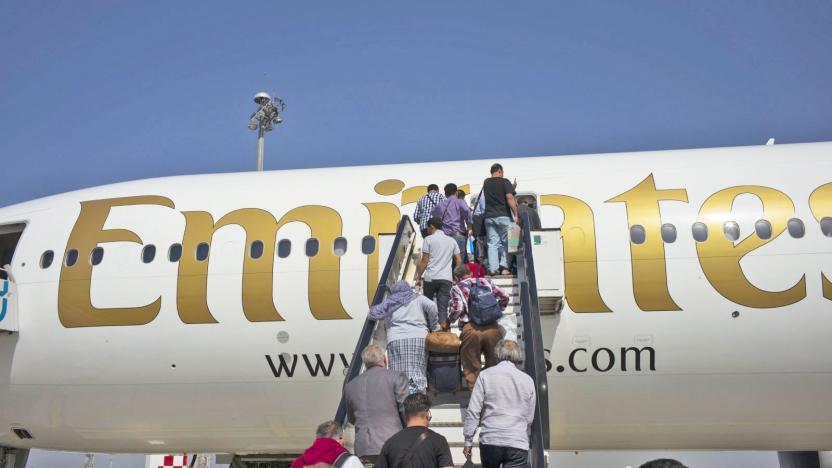qatar
Latest

Qatar’s contact tracing app put over one million people’s info at risk
A security flaw in Qatar’s contact tracing app put the personal information of more than one million people at risk.
Christine Fisher05.26.2020
MIT's new GPS system uses satellite images to put you in the right lane
If you've ever used GPS navigation while driving in an unfamiliar place, chances are you've had more than one incident with last minute merging -- likely because the GPS hasn't picked up on the number of lanes on the road, or where they lead to. But this particular annoyance's days could be numbered, thanks to research from MIT.
Rachel England01.24.2020
VW will roll out self-driving electric shuttles in Qatar's capital
If you visit Qatar in the next few years, you might find yourself riding in a driverless vehicle. Volkswagen and Qatar have struck a deal that will bring self-driving electric vehicles to the public transportation network in the capital city of Doha before the end of 2022. A total of 35 autonomous ID Buzz vans will carry up to four people each on semi-fixed routes in the Westbay area, while Scania buses will handle larger groups. VW's MOIA and Audi's AID will handle the software needed to run the service.
Jon Fingas12.15.2019
Side view satellite images turn the Earth into 'Sim City'
Satellite images can still enlighten and delight, but we're so spoiled by constant views from space that it's hard to surprise us. Satellite imaging company Planet has managed to do just that, however, with a collection of new images, including a shot of the man-made Pearl-Qatar island in Doha. Rather than shooting straight down, the satellites captured the images from oblique angles, creating orthographic-type views reminiscent of games like Sim City.
Steve Dent04.11.2018
Al Jazeera’s Snapchat channel blocked in Saudi Arabia
Al Jazeera's Snapchat presence is the latest casualty in the ongoing diplomatic crisis between Qatar and its neighbors in the Middle East. The Wall Street Journal is reporting that Snap has blocked the news outlet's channel in Saudi Arabia. Al Jazeera is describing the ban as "an attempt to silence freedom of expression."
Saqib Shah09.18.2017
Qatar blames current crisis on fake news inserted by hackers
This week a diplomatic crisis hit the Middle East as several countries (Saudi Arabia, Bahrain, Egypt, the United Arab Emirates, Yemen and Maldives) cut ties with Qatar, accusing it of supporting terrorist groups. Now Qatar's foreign ministry has issued a statement putting some of the blame on a fake news story. In a statement, the ministry said hackers installed a fake file on the Qatar News Agency last April, before activating it Monday morning. Reuters reports that file claimed Qatar's Emir Tamim bin Hamad al-Thani made statements warning against confrontation with Iran, and gave support to groups like Hamas and Hezbollah. Qatari officials did not identify who it believes pulled off the hack, but thanked the FBI and the British National Commission for Combating Crime for their assistance in the investigation. Previously, CNN claimed that US government investigators believed hackers based in Russia were behind the breach -- a claim that Russia's government has denied.
Richard Lawler06.07.2017
Emirates will hand out Surface tablets on flights from Dubai
In mid-March, the US hastily instituted an indefinite ban on electronic devices larger than a cellphone from being carried on to the flights of nine Middle Eastern airlines. Reportedly, it was to prevent terrorists from sneaking an explosive-laden fake iPad into the cabin, though few details on the specific threat have emerged in recent weeks. To compensate travellers for the hassle of spending hours on a flight without their trusty laptops, Emirates has begun offering complimentary Microsoft Surfaces for the durations of affected flights.
Andrew Tarantola04.06.2017
Web Marketplace for Windows Phone gets 22 more stamps in its passport
If you've been holed up in Thailand, waiting to browse the latest and greatest apps for your Windows Phone in your browser instead of on the device directly, then things are looking up. Microsoft has just announced that 22 new countries are being graces with their own web Marketplace. The full list covers Bulgaria, Costa Rica, Croatia, Estonia, Iceland, Latvia, Lithuania, Romania, Slovakia, Slovenia, Turkey, Ukraine, Venezuela, UAE, Bahrain, Iraq, Saudi Arabia, Qatar, Kazakhstan, Israel, Thailand, and Vietnam. The same blog post advises that work is also underway to improve the search results delivered by the site. So you might not have to play Hungry Birds for much longer.
James Trew05.03.2012
Qatar building fleet of remote control 'clouds' for World Cup 2022
When Qatar, an insanely wealthy Arab emirate roughly the size of Connecticut, won the bid to host the 2022 World Cup, one of the stipulations was that its newly constructed open-air soccer stadiums would be air conditioned. Of course, this is Qatar we're talkin' about here, so the solution would have to be as extravagant as its insanely wealthy Arab emirate status implies. That's why it was no huge shock when The Peninsula reported plans to cool at least some of the nine stadiums by using a fleet of solar powered "clouds," designed and constructed by a certain Dr. Saud Abdul Ghani and his team. Dr. Ghani, the head of Mechanical and Industrial Engineering at Qatar University, said that the aircraft (more accurately described as really, really slow drones) will be operated by remote control, made of 100 percent light carbonic materials, and will initially cost half a million dollars each. But, really, what's a few million dollars when it's for a good cause?
Joseph L. Flatley03.27.2011
NYU prof installing camera in the back of his head, JW Parker Middle School teachers insanely jealous
You've wished you had a camera implant, right? We mean, it's pretty common: you've been on the bus or the incline and something went down and you were like, "I wish I was recording this right now." Well, we know of at least two folks looking to replace their prosthetic eyes with webcams, and now an artist living in New York wishes to sport an implant of his own. Wafaa Bilal, an NYU photography professor, plans on having a camera attached to a piercing on the back of his head for one year. Throughout that time, still images will be taken at one minute intervals and displayed at Mathaf: Arab Museum of Modern Art in Qatar. The work, titled "The 3rd I," is billed as "a comment on the inaccessibility of time, and the inability to capture memory and experience," although it really sounds like the dream of every teacher and parent since time immemorial: to have eyes on the back of their head. Of course, the privacy of Bilal's students is being taken into consideration, although the school is not exactly sure how they're handling that one yet -- either the camera will be covered while he teaches or shut off altogether while in NYU buildings.
Joseph L. Flatley11.17.2010
iPhone 4 hits UAE and Qatar, but without FaceTime installed
The iPhone 4 launched this weekend in Qatar and the United Arab Emirates, but buyers wound up with a surprise -- their handset's front-facing cameras couldn't do FaceTime. The National reports that the video chat feature is missing from phones sold at UAE carriers Etisalat and du, as well as those from Vodafone Qatar. Carriers are blaming Apple for the missing feature, and spokespersons from both Etisalat and Vodafone say they're speaking to Cupertino about reinstating FaceTime post-haste; It was reportedly advertised on Middle Eastern versions of Apple's iPhone website until around September 20th, when all references to FaceTime were removed. TUAW reports that some UAE denizens have actually tested FaceTime on phones bought abroad and found it working just fine, but that the functionality disappears after installing the local version of the iOS 4.1 update. RIM's Mike Lazaridis famously warned that countries threatening to ban the BlackBerry might thumb their nose at other forms of internet transmission too, but if's far too early to tell if Apple was pressured into removing FaceTime or chose to for another reason entirely. It's worth noting that both the UAE and Egypt (also missing FaceTime website ads) have banned certain VoIP services in the past. [Thanks, Mohammed]
Sean Hollister09.26.2010
FaceTime goes missing in Saudi Arabia, much of Middle East
Update 9/24: It looks like the early indications may be correct. One of the UAE's carriers tweeted that FaceTime will not be available there. Update 8am Tues: Several commenters have raised points about this story, most of which fall into two categories: "I already have an iPhone in Country X and FaceTime works fine" & "I work for the cell carrier in Country Y and we're not blocking FaceTime." We appreciate the feedback, but neither of these data points is directly connected to the story. For users who already have iPhones in the affected countries, you didn't buy them there -- at least not officially -- and gray-market or unlocked phones from other regions would naturally have FaceTime. From the cell carrier perspective, 'not blocking FaceTime' is irrelevant, since FaceTime is Wi-Fi only and does not transmit over 3G. One point that may be relevant: restrictions on VoIP technology in Saudi Arabia and the UAE, which could create a regulatory block for FaceTime. --- Looking forward to that new iPhone 4 in Saudi Arabia, Qatar or Yemen? If the preview pages on the various international editions of Apple.com are any guide, you may be missing a key new feature. A Facebook thread from SaudiMac points out that the website graphics for all those countries, plus several others in the Middle East, have lost their FaceTime graphic. You can see the before & after versions of the Saudi site above. This adjustment to the product sites -- just ahead of the anticipated late September launch of the phone in these countries -- may represent merely a cosmetic tweak, keeping the cultural sensitivities of these largely Islamic countries in mind. Or it might mean the feature itself is going to be blocked for iPhone users there; note that it's not just the image that's changed, the current versions of the iPhone pages omit the description of FaceTime as well. We don't know yet, and although we have an email in to Apple's media relations team for comment, chances are we won't hear anything official. If you've got a line to an Apple reseller or cellphone carrier in one of the FaceTime-redacted locales, please send us a quick heads-up. Thanks Khaled
Michael Rose09.20.2010
iPhone in 29 new countries; unlocked in Hong Kong
Our sister site Engadget reports that Apple is now offering unlocked iPhones in Hong Kong via its online store. HK$5,500 (≈ US$700) will buy you an 8GB model, HK$6,200 (≈ US$800) gets you 16GB. The Apple Store's terms and conditions limit sales to individuals in Hong Kong only, but who knows what the gray market will bring. Three Russian carriers will also begin selling unlocked iPhones on October 3, with the 8GB model selling for over US$900. In related news, 29 new countries will begin selling the iPhone, some today: Botswana, Brazil, Cameroon, Central African Republic, Croatia, Dominican Republic, Egypt, Equatorial Guinea, Guinea, Guinea-Bissau, Ivory Coast, Jamaica, Jordan, Kenya, Latvia, Lithuania, Madagascar, Mali, Malta, Mauritius, Nicaragua, Niger, Panama, Qatar, Senegal, South Africa, Turkey and Venezuela. [Via IGM.]
Robert Palmer09.26.2008
15th Asian Games prep for HDTV broadcast
While the Olympics and World Cup have done the HD broadcast thing, in a couple months the 15th Asian Games from Doha, Qatar will be the first ones broadcast in HDTV. According to the host broadcaster they expect to have high definition coverage of the opening and closing ceremonies, as well as athletics, swimming and gymnastics. No word on what channel (if any) will carry the games in the US beginning December 1; but with South Africa preparing for the World Cup and China continuing to roll out HD in preparation for the 2008 Summer Olympics we don't have to worry about high-def being an afterthought anymore.
Richard Lawler09.18.2006